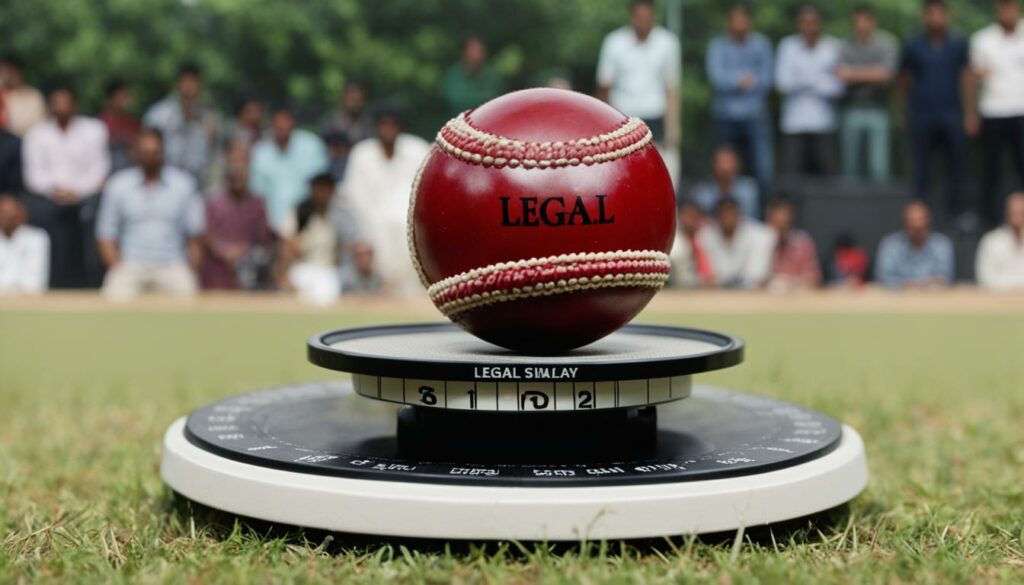Welcome to our guide on the legal aspects of cricket betting. As cricket continues to gain popularity across the world, more individuals are turning to betting as a means of enjoying the sport and potentially earning some money. However, before engaging in any cricket betting activities, it is important to understand the legal consequences and frameworks surrounding them. In this guide, we will provide an overview of the legal implications of cricket betting, including the specific laws and regulations governing it, the overall legality of cricket betting, and the key legal considerations that must be taken into account. We will also delve into the legal framework surrounding cricket betting, examine how to ensure compliance with relevant laws and regulations, and explore the available legal avenues in the event of disputes. Keep reading to gain a better understanding of the legal implications of cricket betting and how to navigate them successfully.
Understanding Cricket Betting Laws
Cricket betting is regulated by a number of laws and regulations that vary depending on the jurisdiction. It is essential for anyone interested in cricket betting to understand these laws to avoid any legal consequences.
One of the most significant legal consequences of cricket betting is being involved in illegal activities. In some jurisdictions, illegal cricket betting can result in fines and imprisonment. It is important to be aware of the cricket betting laws in your area to avoid engaging in any illegal activities.
The specific laws and regulations governing cricket betting differ across jurisdictions, but some common elements include age restrictions, licensing requirements, and taxation policies.
Did you know? In India, cricket betting is regulated by the Public Gambling Act, 1867, which makes all gambling and betting illegal with some exemptions.
Age Restrictions
Cricket betting laws often impose age restrictions to prevent minors from gambling. In most jurisdictions, individuals must be at least 18 years old to participate in any form of gambling or betting.
Licensing Requirements
Many jurisdictions require licensed operators to provide cricket betting services. In such jurisdictions, it is illegal to offer cricket betting services without a valid license. It is vital to ensure that the platform you use for cricket betting is licensed to operate in your area.
Taxation
Another element of cricket betting laws is taxation. Depending on the jurisdiction, customers and businesses engaging in cricket betting activities may be required to pay taxes on their earnings. It is crucial to research the taxation policies in your area to ensure that you comply with all relevant regulations.
Understanding and complying with cricket betting laws is critical to avoid any legal consequences. In the next section, we will discuss the overall legality of cricket betting.
The Legality of Cricket Betting
Cricket betting has been a popular activity for many years, but its legality varies depending on the jurisdiction. While some countries have legalized betting on cricket, others have taken a strong stance against it, deeming it illegal. It is important to understand the laws regarding cricket betting in your area to avoid any legal consequences.
In countries such as India and the United Kingdom, cricket betting is legal, but it is regulated by the government to prevent harm to the public. However, in countries such as the United States, betting on cricket is illegal and can result in severe consequences for individuals involved in such activities.
It is crucial to note that engaging in illegal cricket betting activities can result in criminal charges and hefty fines. It is therefore essential to comply with the legal framework in place, which varies from country to country.

Individuals who wish to participate in cricket betting should also be aware of their responsibilities and legal obligations. This includes adhering to responsible gambling practices to ensure that their actions are not detrimental to themselves or others.
Understanding Legal Jurisdictions
It is important to respect the legal jurisdiction in which you are located and to ensure that cricket betting is legal in that area. This will significantly reduce the risks associated with engaging in illegal activities.
Additionally, individuals must understand the different legal frameworks in place and how they apply to their cricket betting activities. This knowledge can help individuals make informed decisions and avoid any legal consequences.
The Role of Regulatory Bodies
Regulatory bodies play a critical role in ensuring compliance with cricket betting laws and regulations. These bodies are responsible for licensing and monitoring betting platforms, ensuring that they comply with legal requirements.
The existence of regulatory bodies provides greater transparency and accountability in the cricket betting industry, ensuring that individuals can participate in cricket betting activities safely and responsibly.
Legal Considerations for Cricket Betting
While cricket betting can be an enjoyable pastime, individuals must be aware of the legal considerations surrounding this activity. It is crucial to understand and follow the regulations put in place to avoid legal consequences.
Responsibility and moderation are key in cricket betting. Individuals should only bet what they can afford to lose and avoid borrowing money to fund their betting activities. It is also essential to develop a betting strategy and stick to it.
Familiarity with cricket betting regulations is vital. Individuals should research and understand the regulatory frameworks in their respective jurisdictions and ensure compliance with these regulations. For instance, in many countries, it is illegal to involve minors in cricket betting activities.
Adherence to responsible gambling practices is crucial. Self-exclusion programs and other support services are available to individuals who may need assistance with gambling addiction.
The use of licensed platforms is another critical legal consideration in cricket betting. Betting platforms that are licensed and regulated will ensure individuals receive fair treatment and protection of their personal information.
To ensure that individuals are aware of and understand these legal considerations, regulatory bodies provide relevant resources. It is also advisable to consult with legal professionals when in doubt.

“It’s important to be aware of the legal considerations of cricket betting to avoid any consequences.”
The Legal Framework for Cricket Betting
Cricket betting is subject to a specific legal framework that varies from one jurisdiction to another. Understanding the lega framework for cricket betting, including licensing and regulatory requirements, is essential for individuals who want to engage in these activities without facing legal consequences.
| Legal Considerations | Description |
|---|---|
| Licensing Requirements | Individuals who want to operate a cricket betting business may need to obtain a license from the relevant licensing authority. |
| Taxation Policies | Cricket betting businesses may be subject to taxation policies that vary based on their location and other factors. |
| Regulatory Bodies | Regulatory bodies are responsible for enforcing cricket betting laws and regulations, and may have the power to investigate and prosecute individuals who engage in illegal activities. |
As with any type of betting or gambling activity, it is important to ensure compliance with all applicable laws and regulations. This includes understanding and adhering to licensing and taxation policies, as well as establishing clear lines of communication with regulatory bodies.
By staying informed about the legalities of cricket betting, individuals can make informed decisions and minimize their risk of facing legal consequences.
Ensuring Compliance with Cricket Betting Laws
It is essential to understand and comply with cricket betting laws to avoid legal consequences. One way to do this is by using licensed platforms, which ensures that the platform adheres to specific regulations and can be held liable for any violations. In addition, individuals should also familiarize themselves with the legal jurisdictions governing cricket betting to avoid involvement in illegal activities.
To ensure compliance, individuals should also practice responsible gambling, which includes setting betting limits, knowing when to stop, and seeking help when necessary. By following these guidelines, individuals can engage in cricket betting within the legal boundaries and with minimal risk of legal implications.
“Using licensed platforms is an effective way to comply with cricket betting regulations while also mitigating legal consequences.”
Seeking Legal Redress in Cricket Betting Disputes
Despite taking precautions to ensure compliance with cricket betting laws, disputes may still arise. In such cases, seeking legal redress is an available option. Being aware of the potential legal implications of cricket betting can help individuals navigate the legal system more effectively.
Legal disputes related to cricket betting may involve issues such as non-payment of winnings, disputes over bets, or fraudulent activities perpetrated by betting operators. In such cases, individuals may need to seek legal advice and representation to protect their interests.
Arbitration
One potential avenue for resolving cricket betting disputes is through arbitration. This involves the appointment of a neutral third party to adjudicate the dispute and make a binding decision. Arbitration can be a faster and less expensive alternative to going to court.
Many cricket betting operators have their own dispute resolution procedures in place. Such procedures may involve appointing an independent arbitrator or mediator to resolve disputes between the operator and the individual.
Legal Proceedings
If arbitration is unsuccessful or not available, individuals may need to resort to legal proceedings to seek redress. In such cases, legal representation is typically required to navigate the complex legal system.
| Legal considerations for cricket betting disputes: |
|---|
| Consulting a legal expert to assess your case. |
| Preparing a comprehensive case with all relevant evidence and documentation. |
| Understanding the legal procedures involved in filing a case. |
While legal proceedings may take longer and be more expensive than arbitration, they can provide a necessary means of seeking redress for individuals wronged in cricket betting disputes.
In conclusion, individuals should be aware of the potential legal implications of cricket betting and take all necessary measures to ensure compliance with relevant laws and regulations. In the event of disputes, seeking legal redress may be necessary and require professional legal advice and representation.
Conclusion
In conclusion, it is essential to understand the legal implications surrounding cricket betting. Individuals engaging in cricket betting activities must be aware of the legal frameworks in place, including laws and regulations governing these activities.
Adherence to responsible gambling practices and compliance with licensing requirements and taxation policies are crucial for ensuring compliance with the legal framework in place for cricket betting.
Individuals must seek redress through arbitration or legal proceedings in the event of cricket betting disputes to ensure their rights are protected under the legal framework.
By understanding the legal implications of cricket betting, individuals can ensure that their activities comply with relevant laws and regulations, minimizing the risk of legal consequences.
Overall, it is imperative that individuals engage in cricket betting activities responsibly and with a clear understanding of the legal framework in place. By doing so, they can enjoy the thrill of cricket betting while avoiding any potential legal consequences.












